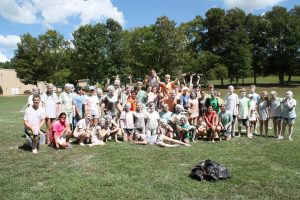
FCS Upper Division students kick off the school year at King’s Mountain Camp. Camp provides opportunities for students to quickly develop lasting relationships while having fun swimming, climbing ropes courses, creating skits with their team, and throwing flour at each other. Back in the classroom, students jump into a typical Upper Division schedule. They have the privilege to begin regular attendance at Dr. Grant’s infamous Humanities lectures. In Humanities, students learn the ideas of the past in order to outline clear moral lessons to apply to their own lives and callings. Students are given weekly opportunities (tests) to wrestle with the ideas and show their teachers what they have learned. Following Humanities, students spend most of the day in their grade-level block classes. During the block class, they intentionally discuss the Humanities lectures, connecting the ideas to other subject areas we discuss including Bible, Literature, and English as well as incorporating the current events of the day. Additionally, there is a significant amount of time spent helping students learn strategies for successful planning, studying, researching, and writing.
Natural philosophy is the classical term for the combined study of mathematics, science, and philosophy. In the spirit of integrating content across curriculum, we offer Natural Philosophy lectures to complement the Humanities lectures. Students in grades 7-12 who are enrolled in a math or science course attend these 30-minute lectures each Wednesday and Friday. The lectures explore math, science, engineering, and technology through a biblical worldview, while showing their connection to the Upper Division Humanities era of study.
In the Upper Division, every student will learn to interact with major elements from their culture, identify the truths and lies, and then offer a biblical response that applies to their own life. Each quarter requires a creative project and presentation including a poetic recitation, thesis paper, and 40-Hour Project. Additionally, during the fourth quarter, the sophomore and junior classes will spar in a debate over a topic relevant to the Humanities syllabus.
The FCS senior year invites students to enjoy both the added level of freedom and the added level of responsibility that accompanies young adulthood. Seniors help maintain the Christian culture of the school and often create what becomes new school traditions. The academic year offers new challenge as well as new and meaningful rewards. For instance, as part of the Humanities/English block, seniors participate in the Lectio Divina—a discipleship program of Bible study, prayer, and personal application—further equipping them to live a life of Christ-like virtue, meaning, and purpose. In addition, much of the year focuses on the senior thesis and oral defense—a truly life-changing process in which seniors undertake an intense study of topics linked to their personal giftings and callings. After several months of research, writing, and preparation, seniors defend their conclusions before a panel composed of their teachers and mentors. This experience strengthens not only their research, reasoning, and composition skills, but also trains them to exercise courage and perseverance, public-speaking abilities, and walking in community. The reward of the Senior Thesis experience is not soon forgotten.
The year ends with a variety of other celebrations as well, including the Junior-Senior Banquet, a trip to the University of Louisville library, and Senior Chapel. Additionally, students enjoy their final high school athletic banquet, drama production, yearbook party, graduation, and of course, their long-awaited senior trip to London and Cambridge (for which they receive .5 Honors Study Abroad credit). This trip is the capstone of their academic career at FCS, where all they have learned in books and lectures comes to life. Through personal discipleship, leadership opportunities, and hands-on learning, seniors gain additional understanding and new vision of how their personal callings can impact culture for the cause of Christ.
